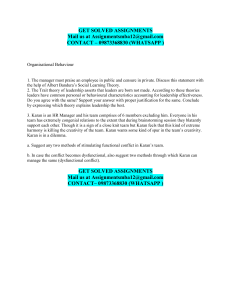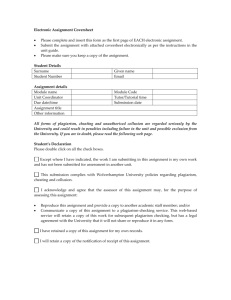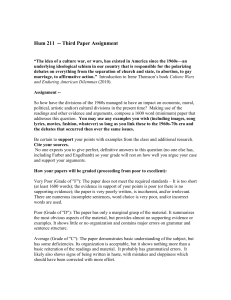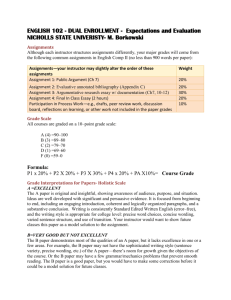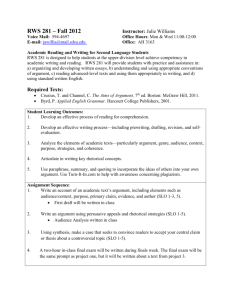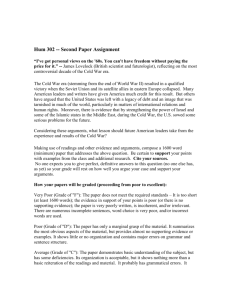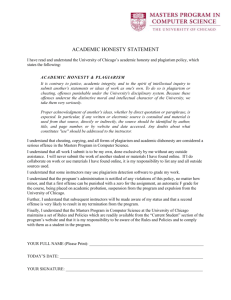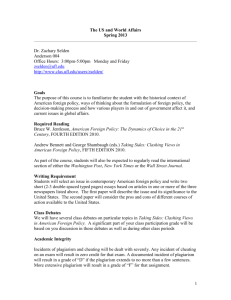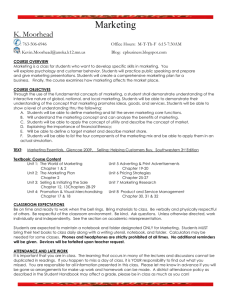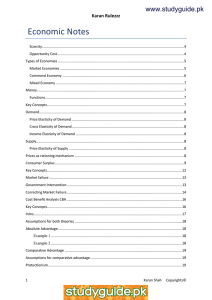PART 1:
advertisement
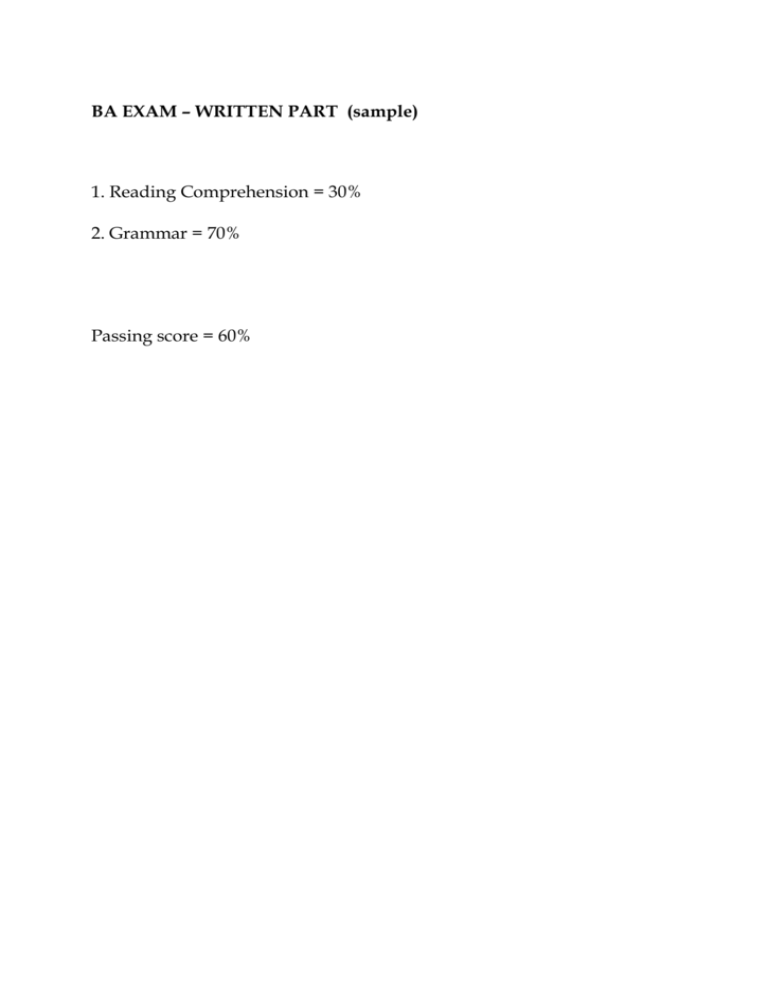
BA EXAM – WRITTEN PART (sample) 1. Reading Comprehension = 30% 2. Grammar = 70% Passing score = 60% 1. READING COMPREHENSION Read the article below and answer the questions based solely on information within the text. You have 30 minutes to read the text and answer the short and longer questions. Grammar counts in the questions that require full sentences. Note that this is a sample – you will have more questions to answer on the actual exam. “Why many international students get a failing grade in academic integrity” (from The Globe and Mail) University students break the rules for a host of reasons – some make a bad decision under pressure at 3 a.m., others insist they were just helping a classmate. But at some Canadian schools, an alarming number of the accused share one characteristic: they came from abroad to study here. The disproportionate number of international students accused of plagiarism or cheating on exams is raising red flags in university administrations and legal aid offices. It also raises questions as to whether schools should be doing more for stressed-out foreign students who are grappling with new educational standards, often while coping with a language barrier. With governments and universities across Canada increasing their efforts to recruit more students from abroad, and some opening branch campuses abroad, there is a growing desire to understand why so many new arrivals are getting a failing grade in academic integrity. Most Canadian universities do not track academic offences by a student’s country of origin, which makes definitive measures of the problem difficult. But those on the front lines of the universities’ support services and legal aid clinics are certain that a significantly higher proportion of international students are getting in trouble. The imbalance is striking at Downtown Legal Services, the University of Toronto legal aid clinic that assists students charged with academic offences, said staff lawyer Karen Bellinger. “I would say, anecdotally, that well over 50 per cent of [clients] are international students,” she said. This group makes up about 12 per cent of the total student body at U of T. After perceiving a similar trend, the University of Windsor began keeping track three years ago. A 2008-2009 report from Academic Integrity Officer Danielle Istl shows one in 82 international students was accused of academic misconduct, compared with one in 300 domestic students. Both numbers decreased the next year, but the percentage of international students accused was still more than three times higher. International students facing discipline most commonly say they were reared in drastically different learning styles, burdened with expectations from families that have invested heavily in them, or lacked the confidence to shape and convey ideas in English. Some cheat for the same reasons as anyone – a lack of understanding or attention to what is allowed, especially in grey areas like group work, or a desire to boost flagging marks – but schools increasingly realize cultural barriers can put them at greater risk of academic dishonesty, intentional or not. Karan, who did not want his last name published, is a recent international graduate of the University of Toronto’s Faculty of Arts and Science, and admits he was let off with a warning over apparent plagiarism after copying text from lecture slides word-for-word in a paper. In India, he had relied on reproducing the words of his teachers and rote learning to succeed in India, and was taken aback by the emphasis placed on critical analysis and proper citation of sources in Canada. “Basically [the professor] said I didn’t cite at all,” said Karan. “Back home, we listen to our teachers, and basically mug everything they say. The more you write your answers exactly the way they say it, the better chance you have of getting an A.” Then there’s the weight of expectations carried by many students who have crossed continents and oceans to study, paying high international fees. “I think most students don’t plan on cheating ... it just happens,” Karan said. “Often times, parents back home will be spending a lot of money to send you abroad, and the hope is that with this Canadian degree, you will get a better job back home or sponsor your parents to move.” After all, it costs much more for an international student to study in Canada than it does for a Canadian citizen. A 2006 study published by the Higher Education Academy in the U.K. found that more than 60 per cent of the international students surveyed, particularly those from some Asian countries, believed that failure to use the same wording as a teacher or “authority figure” in an assignment would be the same as criticizing them. It found these students are not “persistent plagiarizers” but suggested it was easier to detect plagiarism in their work than in the work of native English speakers. Most universities consider any presentation of another person’s words or ideas as one’s own without crediting the original source to be plagiarism. After arriving at U of T from Taiwan, Hannah Liu found she and her friends often felt they lacked the vocabulary and writing skills to be confident paraphrasing research material. “If [students] don’t know how to rewrite the sentence, they probably think, ‘I’ll just copy and paste it,’” she said. Niraj Maharaj encounters this explanation often in his role as Student Rights and Support Services Coordinator at the York Federation of Students despite York University’s mandatory English proficiency test for students educated in another language. “A number of students have mentioned that the test doesn’t really register what a university-level essay would look like,” focusing instead on basic grammar and sentence structure, Mr. Maharaj said. Virtually all universities have writing tutorial services, but they tend to be voluntary, and many students don’t take advantage of them until they run into trouble. “The services can be there, but some people don’t have the courage [to ask for help], or it could be an issue of pride,” said Kevin Williams, a Carleton University student from St. Lucia who sought tutoring when his first paper was deemed “on the borderline” of academic honesty. McGill University’s Legal Information Clinic is drafting a report for the university administration. At U of T, Ms. Bellinger said she has raised the alarming numbers with the Governing Council, and its Anti-Racism and Cultural Diversity Office is also aware. But a U of T spokesperson said, “to the best of our knowledge” Downtown Legal Services has not referred the issue to either body, and the university does not plan to track academic offences by country of origin. Instead, it has initiatives intended to guide all students – from embedding advisers in colleges to holding workshops to train faculty and instructors. Still, Ms. Bellinger feels most students’ training “isn’t that extensive.” Many schools, such as Windsor, have special orientation for international students, but there is a growing push to extend informational programs later into the first term, when students are less “caught up in getting their lives in order,” said Rose Faddoul, counsel at the University of Windsor’s Community Legal Aid. And Windsor may also copy a measure other schools like Concordia University [in Montreal] already use: a short, online academic integrity quiz every student takes when registering for courses. “There’s lots we can do,” Ms. Istl said. “The challenge, though, is time and resources.” Short Questions (50%) Circle the correct answer for each of the following: 1) Karan knowingly ran the risk of plagiarizing. True False 2) Karen Bellinger has firm statistics on the relation of foreign students to domestic students seeking legal aid. True False 3) Are all foreign student plagiarists unaware of what cheating is? Yes No 4) Which of the following does York University's English proficiency test IN NO WAY focus on: a) syntax b) creating a thesis c) morphology 5) Most writing labs and extra student writing help are: obligatory optional Longer Questions (50%) Answer the following questions in full sentences. Use fewer than 15 words per question. Do not repeat more than three words verbatim from the text. Sample question: What misdemeanor did Karan commit? NO points (not a full sentence): “Because of cheating.” NO points (repeated verbatim): “He committed apparent plagiarism after copying text from lecture slides word-for-word in a paper.” Partial points (due to shoddy grammar): “Karan had copy words directly from a lecture.” Full points: “Karan copied a professor’s lecture notes verbatim in one of his essays.” SAMPLE QUESTIONS 1) How does the article imply that “schools should be doing more for stressed-out foreign students”? 2) How do cost of education and cheating go hand in hand? 3) Why might the frequency and rate of foreign cheaters be inflated? 2. GRAMMAR (time: 50 minutes) PART 1: Use the verb in brackets in the appropriate form, and write it in the box on the answer sheet. /10 gaps/ Coming soon... Susan Boyle the musical Singing star Susan Boyle is to see the story of her incredible rise to worldwide success __1__ (BRING) to life in a new stage musical. Actress Elaine C. Smith __2__ (PORTRAY) the unlikely chart star, who __3__ (FIND) fame through Britain's Got Talent. Answer sheet: 1 2 3 brought will portray found PART 2: Complete the text by writing each missing word in the box on the answer sheet. Use only one word for each space. /10 gaps/ Balmy air, with __1__ temperature of up to 41 degrees in some places, persisted across three broad swathes of West Antarctica long __2__ to leave a distinctive signature of melting, a layer of ice in the snow __3__ cloaks the vast ice sheets of the frozen continent. Answer sheet: 1 2 3 a enough that PART 3: Most numbered lines of the following text are incorrect, each of them containing one grammatical or orthographic mistake. For each mistake, write the correction in the box on the answer sheet. Apart from the correction, your answer should include one word preceding and one word following the correction. Some numbered lines are correct. Indicate these lines with a tick (√) in the box. (Note that if there are any lines without numbers, they are correct and do not count.) /15 numbered lines/ (1) Given their simple construction, its not surprising that sandals were the first crafted (2) footwear, the successors to primitive wrappings. Every ancient civilization seems (3) to had had its own version of the basic design: a stiff sole fitted with straps or thongs. (4) As early as 3500 B.C. the egyptians made imprints of their feet in wet sand, molded (5) braided papyrus into soles the same size and attached rawhide thongs to keep them on the foot. Answer sheet: 1 2 3 4 5 construction, it's not √ to have had the Egyptians made √ PART 4: Read the sentences below and answer the accompanying questions by choosing the correct answer (A, B, C or D). Note that there is only one correct answer to each question. Transfer your answers to the box provided on the answer sheet. /10 questions/ 1 You must come round to my house sometime soon. The word round in the above sentence is a(n) ... (A) preposition Answer sheet: 1 B (B) adverb (C) verb (D) adjective
